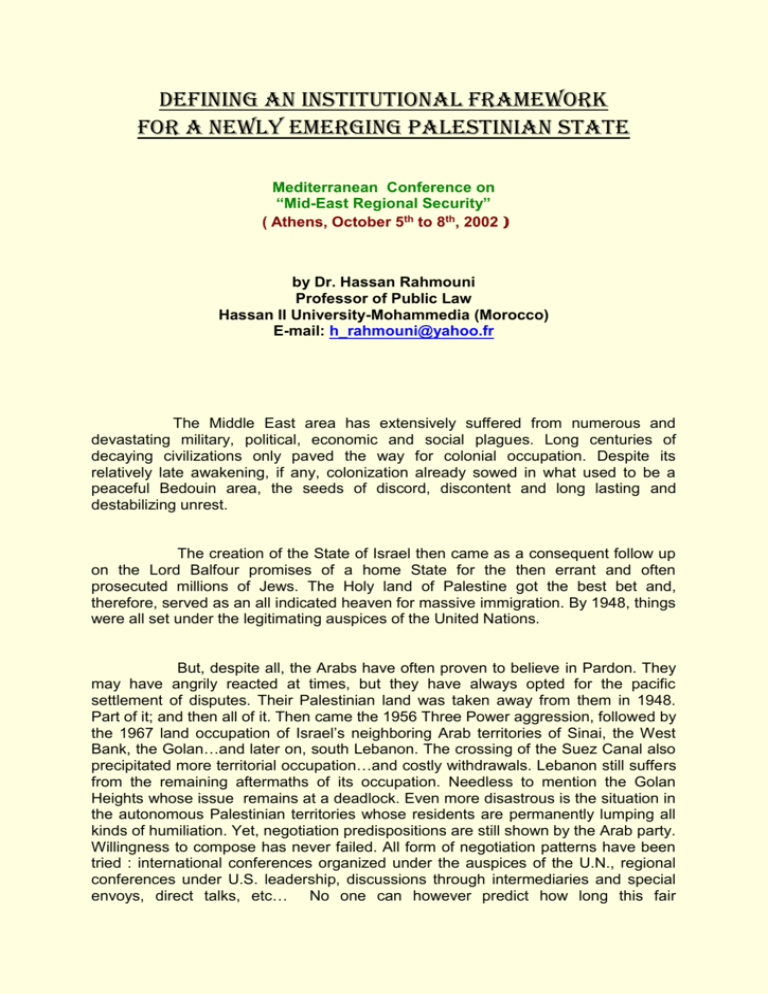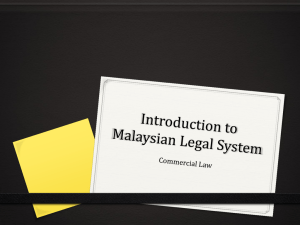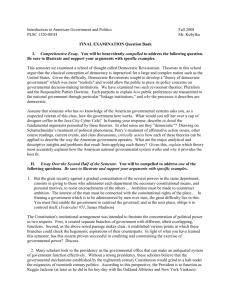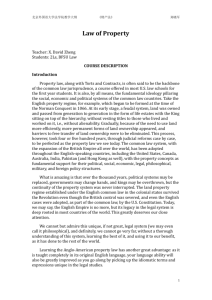Defining An Institutional Framework
advertisement

Defining An Institutional Framework For A Newly Emerging Palestinian State Mediterranean Conference on “Mid-East Regional Security” ( Athens, October 5th to 8th, 2002 ) by Dr. Hassan Rahmouni Professor of Public Law Hassan II University-Mohammedia (Morocco) E-mail: h_rahmouni@yahoo.fr The Middle East area has extensively suffered from numerous and devastating military, political, economic and social plagues. Long centuries of decaying civilizations only paved the way for colonial occupation. Despite its relatively late awakening, if any, colonization already sowed in what used to be a peaceful Bedouin area, the seeds of discord, discontent and long lasting and destabilizing unrest. The creation of the State of Israel then came as a consequent follow up on the Lord Balfour promises of a home State for the then errant and often prosecuted millions of Jews. The Holy land of Palestine got the best bet and, therefore, served as an all indicated heaven for massive immigration. By 1948, things were all set under the legitimating auspices of the United Nations. But, despite all, the Arabs have often proven to believe in Pardon. They may have angrily reacted at times, but they have always opted for the pacific settlement of disputes. Their Palestinian land was taken away from them in 1948. Part of it; and then all of it. Then came the 1956 Three Power aggression, followed by the 1967 land occupation of Israel’s neighboring Arab territories of Sinai, the West Bank, the Golan…and later on, south Lebanon. The crossing of the Suez Canal also precipitated more territorial occupation…and costly withdrawals. Lebanon still suffers from the remaining aftermaths of its occupation. Needless to mention the Golan Heights whose issue remains at a deadlock. Even more disastrous is the situation in the autonomous Palestinian territories whose residents are permanently lumping all kinds of humiliation. Yet, negotiation predispositions are still shown by the Arab party. Willingness to compose has never failed. All form of negotiation patterns have been tried : international conferences organized under the auspices of the U.N., regional conferences under U.S. leadership, discussions through intermediaries and special envoys, direct talks, etc… No one can however predict how long this fair predisposition can last. Attitudes need to change and tangible solutions sought before things get really out of hands. It is an undeniable fact that the Middle East area has been and still is the theater of constant unrest: strikes, counterstrikes, aggressions, occupation, “Intifada”, repression and so forth with seemingly endless upheavals of turbulence. One might rightly wonder where do chances of political breakthroughs stand among all this? The question might also be rightly asked about how much hope there might still be for the emergence of an era of peace and of institution building letting the Palestinian entity finally reach statehood. Let’s just hope that the politicians, negotiators, peace makers and the various other implied diplomats can generate some tangible success! Let’s believe in peace and urge others to do so! It is a fact that the wounds are deep on both sides. But it is also a fact that most people in the area are fed up with unrest, occupation and terror. Let’s still hope that even at times where tanks and other armored vehicles are plowing anger and seeding hatred…the peace dove can hopefully make it through the minefield. Let’s all dare hope that occupation ends soon…and with the dismantling of its knots, all forms of resistance dwindle into disappearance. Time then will be ripe for building the emerging States on new and sound bases: yesterday’s belligerents will then learn to develop a new culture of peace based on mutual acceptance and respect. They will all need to start building the bases of a democratic society and, along its path, a high return economy, on the remnants of a shattered war stricken arena. The children of these States will then have to make extraneous efforts to overcome their adults’ demonstrated destructive temperaments. One might wonder what the prospects might then be? A too optimistic attitude has to be avoided in all cases. Recent past has experienced so many deceptions that caution has therefore to be constantly prevalent. Any agreements will need to be at least engaging for both parties. Bilateral implication will need to be demonstrated during all phases of the process, and particularly during the phase of implementation. Renewed trust is at stake. A global vision of peace perspectives should normally include Israel along with what is now called the front line countries. But evident observation shows that, with the exception of Palestine, which appears to be the only new re-emerging entity, all the others have enjoyed the benefits of statehood during recent decades. All the Arab neighboring States of Israel enjoy one form or an other of Constitutional organization. Democracy might not be enjoying its plenitude all over the area, but seemingly well run in political institutions are normally operating. Apparent legislative, executive and judiciary structures function smoothly within remarkably stable institutions. Yet, invisible iron fist structures are evidently underlying most Middle Eastern political systems. Would that be an acceptable model for the newly emerging Palestinian State? Or, haven’t the Palestinian paid an expensive enough bill for finally aspiring to acquire the plenitude of their liberty? Let’s modestly join the positively ongoing effort of “Political Stability Enhancement” in the area through a mere contribution of global ideas on the subject along the three main tracks of “Political Democracy Building”, “Judicial System Strengthening” and “Transparency Fostering”. I. The Quest for Democracy : The Palestinian people have suffered so much from oppressive occupation that they definitely are most eligible for democratic quietude. There are high expectations to overcome privation and injustice through authentically chosen representatives who will lead, govern and administer a basically development apparatus, meanwhile called upon to launch new values, traditions and leadership patterns. Various challenging fronts will need to be faced as will be numerous the challenging missions to be carried out. If it is certain however that only democratically elected institutions can quench the growing thirst for change and development, it is also as evident that other organizational accompanying measures will have to be set forth from the outset. a. A Presidential or a Parliamentary Regime ? There is no intention here, whatsoever, to take the role of a “Father Sieyès” of modern times ( Father Sieyès was mostly known for always walking along the corridors of the French Assembly with multiple draft solutions in his pocket for various constitutional issues raised in the aftermath of the French revolution of 1789). But the possibility is offered for the State building Palestinians to choose among various existing political systems. The strengths and weaknesses of the various existing systems are known; and so is their adaptability to various political choices. Both of the most expanded of them imply a modern style Montesquieu regime of separation of powers. But some will allow for respective political action of one branch of the state on the other ( such as the dissolution of the assembly or the overthrow of the government by a majority vote in the Parliament ) while others will specify the precise exercise of a system of checks and balances without necessarily generating any executive instability or any legislative uncertainties. Whether there is a single Chief of State who governs with the help of a Cabinet directly responsible to him or whether the executive power is invested in a prime Minister appointed by the Chief of State, removable by him and directly responsible to the legislative Assembly is a determining choice that only a Palestinian duly elected Constitutional Assembly can determine. It will also have top benefit from compared experiences and success stories of a wide range of world wide experimented intermediary systems which are available for its reasoned choice. b. A Bi-party or a Multi-party System ? It is also known that the party system generally determines the stability of a regime as well as the degree of efficiency of its executive branch. Government stability is generally assured in systems with a limited number of parties, or with stable forms of coalitions. Numerous cliques, organized in political parties often generate instability due do multiple causes of dissatisfaction of one political trend or an other. The government is thus constantly questioned and non confidence votes easily passed. It is known that most governments in an alike situation try to preserve their stability through general satisfaction of all the composing tendencies of their fragile majority; and the best way to please everyone is to deploy little or no innovative actions or initiatives. A system on the wake of major development challenges needs to have a strong executive rather than multiple uncontrollable tendencies. Yet, present day political crumbling, progressively ploughed by decades of dissent or political divergence, shows all predispositions to a multi ramified partisan system. Re-grouping tendencies have however proven to be feasible through various constitutional and legal stipulations in similar political environments. It will all depend on the will of Palestinian founding constitutionalists. All the rest is pure technique, formulated in legal terms. c. The Choice Dilemma of an Adaptable Electoral System : Political implication of the population has become an unquestionable must. The verdict of the ballots has proven to allow for democratically chosen and politically responsible decision makers. So, there is no doubt about the necessary call on the polls to arbitrate between the different pretenders to popular legitimacy. Yet, various electoral systems are known to lead to various pre-desired political situations. The issue of the vote will vary according to the applicable polling system: under the same conditions, the results will be different according to whether the voting age is 21, 20, 18 or, as it has been fixed in countries like Brazil, Cuba and Nicaragua, to the age of 16. The issue will also be different based on whether it is a uninominal majority system or a uninominal proportional basis vote, on whether it is a direct vote or an indirect choice mode of elected officials. Some choices definitely favor conservative vote while others tend to favor more progressive political choices. Results may also vary according to the list system used ( if deemed preferable to the uninominal candidacy system) : blocked lists, preferential lists, mixed lists or incomplete lists offer a wide range of electoral organization choices. Other electoral techniques have also proven to have unquestionable pre-planned effects on the final issue of the poll. Campaign organization and proportional media use by the protagonists also needs to be carefully defined in order to avoid any undesired and harmful situation to the free democratic expression of choice. d. The Unavoidable Appeal To A Strong Executive : The definition of institutional functioning patterns will need to allow for the necessary emergence of a stable, efficient and well organized executive branch of government. Alternation mechanisms will definitely need to be defined; but there will also be a vital need for stability in order to ensure the minimal guarantees for action continuity and for measurable evaluation of success and control of results. The executive function will be carried out not only through multi sector ministerial departments, but also through other forms of public offices and agencies which can offer better flexible managerial institutions both for long range development and for more immediate satisfaction of the basic needs of the citizens. Decentralized administration also presents the inestimable value of allowing a democratic choice of local decision makers and a closer proximity of decision taking to the areas and fields of action. Locally elected councils also offer the opportunity for consolidating democratic traditions at the grassroots. But multiple precautions will need to be outlined in order to avoid any tendencies of abuses and potential corrupt practices. These are part of the mission of the performing judicial system which will need to be implemented. 1. II. An Equitable Judicial System : There can be no claim for democracy if there is no protection of human rights: civil rights, political guarantees, social parapets and economic assurances. All uncertainties may dwindle however if there is a well organized non corruptible judicial system. The justice seeker needs to find a whole set of well functioning judiciary structures that can allow him to seek and obtain his right whenever unduly taken away from him. Not only must criminal justice be un-partially applicable with all its might to ensure calm and security for the normal functioning of the society, but civilian and special courts must equally incarnate the just restitution of rights to the victims of fraud, deceit and/or abuse of power. a. Organizing Common Law Courts : Progressive implementation of primary civilian courts, which can also be called “First Instance Courts”, along with courts of appeal and a higher judicial institution in the form of a Supreme Court implies not only a huge organizational effort and massive quality training of judges and lawyers, but also necessitates a long run patience for establishing judicial traditions, constant jurisprudence and law enforcement mechanisms. Organizational details of these courts may allow for the existence of various court Chambers according to the areas of competence covered by these courts. Applicable regimes to “sitting” judges as compared to those of “standing” justices impact variably on the examined cases. So do applicable procedures too. The image will be much more complicated considering the multi confessional profile of the Palestinian society. An applicable civil law judicial system will need to seek its inspiration both from comparative positive law and from pure local authenticity. Appropriate consulting is also very feasible as a back up support for national judiciary leading pioneers. b. Structuring Commercial Tribunals : Economic development implies necessarily the outbreak of a multitude of legal and commercial disputes, mostly linked to investment, trade conflicts and fiscal litigations that traditional personal status justices are seldom prepared to adequately deal with. The nature of these conflicts is so different from the marriage, family, heritage and divorce issues that special training and long run exposition to economic activities and/or banking practices must be prevailing in the profiles of the justices to be invested with such affairs. Both national and foreign investors will watch attentively the deployment of such judicial practices before venturing in the arena. And so will all other observers and potential visitors of this holy land. Triple level jurisdiction is also an unavoidable structuring requirement: primary commercial courts, commercial courts of appeals and a supreme court commercial chamber appear to be adequately applicable for settling trade disputes. c. Supplying Administrative Jurisprudence : The nature of economic and commercial conflicts is not only that which opposes private conflicting parties with each other, on the bases of contradictory claims about some issues, but there are also numerous cases where the defendant is the public administration itself and in which its simple day to day relations with the ordinary citizens is at stake. European continental law has produced a wide range of relevant experiences that many Mediterranean countries have successfully reproduced. These vary from administrative tribunals, to Ombudsmen, “Prokuraturas”, “Mediateurs” and other “Conseil d’Etat” type of jurisdictions in charge of examining complaints to which public servants or government officials are litigious parties. Just in the case of administrative justice, France has played a pioneering role since 1789 when it had resolutely enacted revolutionary laws that clearly distinguished between rules applicable to the relations between ordinary citizens and rules applicable to public institutions in their relations with the administered public. In fact, the laws of August 16-24, 1790 ( 16 fructidor, year III) had more of an institutional target objective of withdrawing administrative acts from the competence of civilian judges. Court cases (Arrêt Blanco, Tribunal des Conflits, Feb. 8th, 1873) later enforced this law into a judicial precedent calling for the necessary existence of special administrative courts to apply this special administrative law. Many Mediterranean countries have followed the French example since. And in most of them, there is a real existence of administrative jurisprudence. There is evidently a lot to gain for a newly emerging legal system to learn from successful neighboring experiences of guaranteeing to potential plaintiffs a judicial protection against administrative abuses. d. Institutionalizing Other Special Courts of Justice : A wide variety of special courts can also be instituted to answer specific types of litigations. There must however be a constant awareness of the risk of unnecessarily multiplying institutions potentially condemned to become ineffective. A newly emerging State can only recourse to necessary instruments and progressively build up according to the expressed needs. Yet, the wide range of possible sources of inspiration can be exposed to the attention of the potential decision makers. For crimes of corruption, traffic of influence, abusive use of public funds committed by public servants during the exercise of their functions, special criminal procedures applicable before a “Special Court of Justice” can be designed. The definition of a public servant here can be very extensive and reach such employees as those who work in private institutions invested with a public service type of mission. National banks may sometimes fall within the sphere of competency of such a court. Audit courts can also play a major role in securing other forms of protection against abusive behavior of public administration: they mainly aim at exercising a control of finance law enforcement. If the burden of cases grows, they may be assisted with regional courts of audit to be legally instituted in the same conditions as the central audit court. Communal courts and small district courts can also prove to play an important role in alleviating the burden of ordinary courts by examining the numerous small and trivial cases brought before them by ordinary citizens. Their proximity to the population along with the simplicity of their procedures make them more affordable and quickly responsive. Yet, simplicity must not be at the cost of justice and equity. 2. III. Fostering Transparency : 3. 4. There are some fundamental prerequisites for a democracy to be considered as such. Human rights and free expression of the various public liberties is one of them. There is therefore a vital need to assort the democratic choice of public office with an equal and authentic freedom of speech, of the press, of association and of entrepreneurial initiatives with no undue restrictions whatsoever. a. Guaranteeing Public Liberties : To what extent would a system of “Habeas Corpus” and of a “Bill of Rights” be locally applicable to a society still striving to search for its identity confirmation. Extensive liberties might appear like idle fancies in the present context. But numerous are present day realities for which founding fathers dared say that they “had a dream”. One of the first bills that will need to be enacted in the new Palestinian State will definitely need to be a Chart of Human Rights and Liberties. Thus, will be defined the limits within which such liberties as those of the press, reunion, assembly, association and so forth will be enjoyed. Will also be precisely determined the sentences and punishments incurred by those who infringe the legally established limits. Major steps towards protecting and guaranteeing human rights and public liberties can be made through the institutionalization of a superior council of human rights, habilitated to investigate and look into all claims and accusations of human rights violations. Parliamentary investigation commissions may also efficiently undertake such missions and assume the responsibility of stating the true versions of facts. Many other forms of public follow up of the free exercise of liberties can complete the action of the already existing international P.V.O.’s already peeking into unclear and doubtful behaviors. Local associations may also focus on such a sensitive and vital aspect of appreciation of State maturity in respecting human rights and humanitarian values. b. Enforcing Freedom of The Press : A special attention needs to be given to the media. The more useful it can prove to be in the promotion of democratic values, the more detrimental it can as well be to a system which accords little no or care at all to the unmeasurable capacities of the press. There needs to be enacted legislation from the outset that clearly defines freedom of the press. A special code of conduct for the media will have the clear advantage of defining the rules of the game. A sort of national media board, comprising representatives of the press community can also bring positive contributions to the action of ministerial communication and information authorities. Other forms of support need also to be brought to the media community during its early development stages. Experience tested in many other states of the region has shown relevant results in terms of democratically developing freedom of the press through moral and material incentives extended to the mass communication vehicles. Trends to liberalization and privatization of printed and audio visual media also have to be encouraged, within specific regulations that will prevent the abusive use of such strategic weapons and instruments of political action. c. Rebuilding Confidence : Here is where transparency best finds its noble means of expression. A long run program of multi-faceted activities can be defined to develop the social, psychological and cultural components of a new profile building. The question is here about gently moving a social environment from either passive submission to occupation or bellicose reaction towards the various expressions of injustice to a constructive perspective of development leadership, political initiative and institution building. This mission might probably take decades before effective results are stabilized. Massive education along with constant specific topic media programs can prove to be somewhat useful. This will all need to be planned and carried out through a well thought of plan of action aiming at generating seemingly spontaneous patterns of self confident behavior and trust in the fragile equilibrium which a hopefully negotiated peace process will have led to. The confidence building process which will have then been generated with the impulsion of specialized public agencies will be later spontaneously carried out under the conjugated effect of a multitude of complementary factors. The generated dynamics along with the confirmation of other components of statehood will allow the newly born entity to reach its adult stage. Its effects will hopefully be very perceptible at the domestic level. The agenda will then be quite challenging; but it will prove at the end extremely rewarding. More attention can then be paid to ameliorating the new entity’s image and presence in the outside world. More assets will then positively serve the development interests of the Palestinian public diplomacy. d. Developing an International Presence : Perspectives of multi aspect growth for the new State to be are very promising. Multiple sources of support have expressed their readiness for assistance and support. Yet, most of them are very demanding in terms of credibility, honesty and quality work. All conditions for meeting these demands and many more can be supplied through a well thought action program as previously outlined. Foreign agencies and international relief institutions will be heavily counting on locally reliable vis-à-vis. These will have to be prepared for them, trained, sensitized and made known. The national media program will also have to be activated overseas in order to better sell the new product stemming from statehood. Palestinian diplomacy will then have made a giant leap towards rewarding achievements and self satisfaction. September 2002









